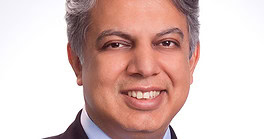Eileen O’Mara, Stripe’s EMEA Revenue and Growth leader, speaks to Global Finance about working with clients to stay at the forefront of digital business trends.

Global Finance: What drives your innovative spirit in this highly competitive marketplace?
Eileen O’Mara: Millions of businesses rely on Stripe’s platform to build and run sophisticated financial operations. Whether it’s launching in a new market, introducing a platform strategy, driving down fraud or streamlining reconciliation, we thrive on removing complexity for our users. We’re proud to support some of the largest and most ambitious businesses in the world—businesses like Ford, Amazon, Deliveroo and Booking.com—and we work hard to stay ahead of their needs. We try to not just build for what they need today, but for what they’ll need a few years from now.
GF: What are your clients’ pain points?
O’Mara: It’s not getting any easier to operate a business globally, even if you’re 100% online. Customer expectations are growing, and seamless, localized experiences are becoming the norm. At the same time, the world is more uncertain, fragmented, competitive and price sensitive. Businesses can’t really afford to make mistakes.
Therefore, large established businesses are coming to Stripe. They trust us to accelerate the reinvention of their business models and map out their next stage of growth. We’re working with businesses like Ford to build new e-commerce experiences for their customers and local dealers. We’ve helped Le Monde introduce a new subscription service and launch an English version of the paper internationally. And we even help companies like Amazon provide better localized e-commerce experiences around the world.
GF: What strategic developments at Stripe will ensure your continued success?
O’Mara: Our primary operating principle is “users first,” so everything we build at Stripe tends to develop from what our users need. And because we work with millions of businesses, we’re able to identify what’s going to drive meaningful change for companies.
That means that building out our core payments and treasury network is always a focus. We now enable businesses in nearly 50 countries. We support more than 50 payment methods, including ApplePay, Klarna, Alipay and WeChat Pay. We support payouts to 72 countries, including with crypto. And we do this seamlessly between online and offline.
But Stripe isn’t just a payments company; we are building financial infrastructure for businesses. Our users want to operate more efficiently, so we’re developing a suite of software-as-a-service [SaaS] products to help with everything from ID verification to tax compliance and fraud management. And to open new revenue streams for businesses on Stripe, we’re building banking-as-a-service tools, which allow nonfinancial companies to embed financial services into their product offering.
GF: What trends are opening up new opportunities?
O’Mara: One thing we’re excited about is the rise of the creator economy, as talented people who share content on platforms like Twitter and Teachable monetize their skills. Take Spotify: It used Stripe to launch a new subscription service to help its podcasters accept payments from fans around the world. Across the top 50 platforms that run on Stripe, creators have so far made $10 billion in earnings, and 670,000 new creators signed up last year. This is an exciting chance to open economic opportunity for people around the world.
The growth of embedded finance is also promising. Small businesses are still poorly served by financial services; around 55% of them still must go to the bank in-person. Often these small businesses run on industry-specific SaaS platforms, which they use for things like scheduling or accepting payments. Many of these platforms are turning to Stripe to integrate financial services like loans, cards or accounts into their offerings. What’s great is that this tends to be a win for everyone: Small firms get frictionless financial services, platforms can boost their revenue by two to five times, and banks can serve businesses they find it hard to cater to.



